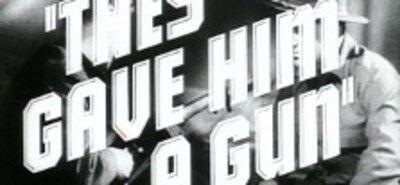They Gave Him a Gun

Brief Synopsis
Cast & Crew
W. S. Van Dyke Ii
Spencer Tracy
Gladys George
Franchot Tone
Edgar Dearing
Mary Lou Treen
Film Details
Technical Specs

Synopsis
Fred P. Willis, a carnival barker, meets Jimmy Davis, an insecure accountant, just as the two enter the army at the beginning of World War I. Jimmy has difficulty with army life, especially using a weapon. He wants to desert so that he won't have to kill anyone, but Fred slugs him, then later convinces him to stay on. Soon Jimmy becomes the best shot in his outfit and yearns for "moving targets." When the unit goes to France, Jimmy becomes a hero when he is wounded after shooting several German soldiers, and no one knows that he shot one of them after the soldier raised his hands in surrender. In the hospital, while recuperating from his wounds, Jimmy falls in love with nurse Rose Duffy, who is fond of him, but is really in love with Fred. Fred returns her love, not realizing that Jimmy is completely dependent upon Rose. When Fred is reported killed in action, Rose accepts Jimmy's proposal, not revealing that she loved Fred. Fred soon returns, however, having only been missing in action, but when Jimmy says that he would die without Rose, Fred decides to give her up. When Rose visits him, he pretends that he is already married and sends her away. Some years later, Fred runs into Jimmy on a street in New York, just after a gang shooting has occurred. Fred is suspicious that Jimmy is a hired killer when their old platoon leader, Sergeant Meadowlark, now a policeman, also runs into him and tells him that the killer was an excellent shot. Fred goes to see Jimmy and Rose and realizes that their prosperity comes from murder. He tries to convince Jimmy to stop, but Jimmy says he finds killing gangsters easy after the government ordered him to kill decent soldiers. Rose goes to see Fred after learning that he was never married and Fred tells her that Jimmy is a hired killer. Later, after overhearing him plan a job, Rose anonymously reports Jimmy to the police. Although angry at first, Jimmy confesses to attempted murder in court, making Rose proud of him. She says that she will wait for him and he goes to jail. Fred and his friends at the carnival help Rose get away from Jimmy's gangster pals and she becomes one of the carnival workers. While Jimmy is in prison, he becomes embittered after listening to a fellow inmate accuse Rose and Fred of infidelity and the two men escape. He goes to the carnival and realizes that Rose has been faithful, but when he also realizes that they have secretly loved each other since France, he rushes towards the police who are trying to apprehend him and is killed when he fails to raise his hands in surrender.

Director
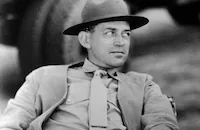
W. S. Van Dyke Ii
Cast

Spencer Tracy
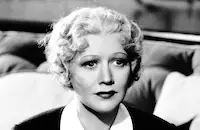
Gladys George

Franchot Tone
Edgar Dearing
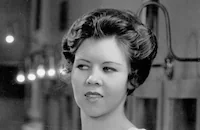
Mary Lou Treen

Cliff Edwards
Charles Trowbridge
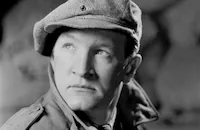
Joseph Sawyer
George Chandler
Horace Macmahon

Gavin Gordon
Ernest Whitman
Nita Pike

Joan Woodbury
Jack Murphy
Edgar Edwards
Mary Jane Irving
Frank Sully
Jack Tarnek
Albert D'arno
George Turner
Richard Parker
Carl Voss
Walter Vogler
Carl Ledel
Dick Wessel
Eric Dahne
William Von Brincken
Robert Graves
Martha Bamattre
Eugene Borden
Alphonse Martell
Harry Tyler

Irving Bacon
Jimmy Lucas
Frank Marlowe
Thomas Carr
Jerry Fletcher
Ralph Malone
John Quillan
George Magrill
Gaylord Pendleton
Charles Sherlock
Duke York
Crew
Major M. C. Bradley
Cedric Gibbons
Cyril Hume
Gus Kahn
Ben Lewis
Richard Maibaum
Harry Mcafee
Harry Rapf
Maurice Rapf
Sigmund Romberg
Harold Rosson
Douglas Shearer
Slavko Vorkapich
Edwin B. Willis
Dolph Zimmer

Film Details
Technical Specs

Articles
They Gave Him a Gun
The story opens in 1917, the year Congress empowered the federal government to fortify the armed forces with a draft. The first draftee we meet is Fred P. Willis, a carnival barker who looks on service in the Great War as just another opportunity to travel around and see how long his luck holds out. Moments later we meet his newest acquaintance, Jimmy Davis, a rural kid who's thoroughly confused by the unfamiliar things all around him, and so scared by combat training that he faints during a bayonet lesson. Fred takes Jimmy under his wing, but acclimating the youngster to army life turns out to be quite a challenge, especially when it dawns on Jimmy that killing people doesn't square with the commandments he learned at church. "I'll work for my country and live for it and be any kind of a cockeyed good citizen they want," he says, "but when they order me to dress up like a monkey and travel 3,000 miles to butcher somebody, I'm walkin' out." And he would walk out a prison stretch for desertion wouldn't be nearly so bad, he reckons if Fred, no sucker for pacifistic twaddle, didn't sock him on the chin and talk him around. Before long Jimmy is acting like a real soldier, finding that he has a talent for marksmanship, and telling Fred that shooting at people would be much more interesting than target practice. He gets his chance when they're shipped off to the French front lines. Ordered to cross a danger zone and secure a church under fire, he enters the building more to hide from the action than to root out the enemy; when he sees one of the enemy inside, he throws up his hands in surrender, only to realize the soldier is safely dead. Feeling a lot better now, he climbs to the steeple and picks off a nest of German machine-gunners who have no idea who's shooting at them.
This earns Jimmy a couple of medals, and also a stay in a field hospital, since he was gravely wounded when the steeple blew up after his semi-heroic act. In his hospital bed he falls in love with Rose Duffy, a nurse whose inner goodness is matched by outer gorgeousness, and he won't listen when she says she only wants to be friends with him. There's another complication, too: Fred has also met Rose at the hospital, and they've fallen madly in love. Jimmy's hopes for romance seem doomed until Fred is lost on the battlefield and declared officially dead. Stricken with grief and no longer caring what her future holds, Rose marries Jimmy out of sympathy and apathy. And then what a surprise! Fred turns up alive, well, still crazy about Rose, and still a decent enough guy to realize that he has no right to interfere with her new life, even though she'd clearly ditch Jimmy in a second if Fred would whisk her away.
They Gave Him a Gun starts as a war movie, and when Rose enters the picture it becomes a love-triangle drama. Now the main characters return to America and the picture morphs into a film noir. Fred and Jimmy run into each other by chance, and Fred now the proud proprietor of his own circus notices that Jimmy is wearing a mighty expensive suit. Wondering what his old pal does for a living, Fred gets a large clue when he realizes that a gangland killing took place just moments earlier at the very building where he bumped into Jimmy, and according to a local police officer (who happens to be their old wartime sergeant) it took first-rate marksmanship to do the hit. Hmm. Fred pays a visit to Jimmy and Rose, confirms his suspicion that Jimmy has turned his army sharp-shooting into a murderous civilian trade, and reveals this to Rose, who hasn't figured it out for herself. Always a model citizen, she tips off the police to Jimmy's next job, thus getting him arrested. He's miffed at first, but in the middle of his trial he gazes into her eyes, hears the voice of conscience, and confesses to the court that he's guilty, guilty, guilty. While serving time in prison, he falls prey to temptation and busts out with another inmate, making his way back to Rose, who's now working with Fred and waiting for Jimmy's release. But the cops have tracked him down and the three are surrounded. Once again Jimmy's conscience rises belatedly to the occasion, leading to the bittersweet finale that every alert moviegoer will have expected from the second or third reel on.
At times, They Gave Him a Gun appears to have a genuinely antiwar message, especially when we see Jimmy's military training give him a taste for killing and push him toward a criminal career in peacetime. Yet this moral is diluted by the film's enthusiasm for Jimmy's slaughter of the German gunners, and by the absence of any real argument to back up its occasional hints of a pacifist viewpoint. The reviewer for Time raised another good point when the picture premiered, writing, "As a preachment against war [the film] would be more persuasive if it did not permit the impression that experience in the trenches may have improved Fred about as much as it weakened Jimmy."
Such shortcomings aside, They Gave Him a Gun gains a reasonable degree of dramatic power from Spencer Tracy's down-to-earth depiction of Fred, a lovable goof whose brash manners and dese-dem-and-dose vocabulary mask an upright personality and a hefty supply of common sense. Franchot Tone seems too refined as Jimmy, but he makes the unsophisticated rube a good foil for Tracy's plainspoken Fred, and Gladys George does the same with Rose, even if the self-sacrificing nurse is too conspicuously virtuous to be believed. The director was W.S. Van Dyke, who keeps the somewhat repetitious story moving at a good clip and takes advantage of MGM's renowned technical resources without letting production values get in the way of what's essentially a gritty, naturalistic tale. The lesson that "war breeds gangsters" is not a "particularly startling thesis," as the Time critic observed, but it's a good one to ponder, and They Gave Him a Gun deserves credit for taking it at least halfway seriously.
Producer: Harry Rapf
Director: W.S. Van Dyke II
Screenplay: Cyril Hume, Richard Maibaum, Maurice Rapf, based on William Joyce Cowen's book
Cinematographer: Harold Rosson
Film Editing: Ben Lewis
Art Direction: Cedric Gibbons
Montage Effects: Slavko Vorkapich With: Spencer Tracy (Fred), Gladys George (Rose Duffy), Franchot Tone (Jimmy), Edgar Dearing (Sergeant Meadowlark), Mary Lou Treen (Saxe), Cliff Edwards (Laro), Charles Trowbridge (Judge).
BW-94m.
by David Sterritt

They Gave Him a Gun
Quotes
Trivia
Notes
According to pre-production news items, this film was originally to have starred James Stewart, and William Joyce Cowen, author of the novel on which the film is based, was to have collaborated on the script with Richard Maibaum and Maurice Rapf. No other source credits Cowen with any contribution other than original source. Portions of the film were shot on location in La Jolla, CA.



